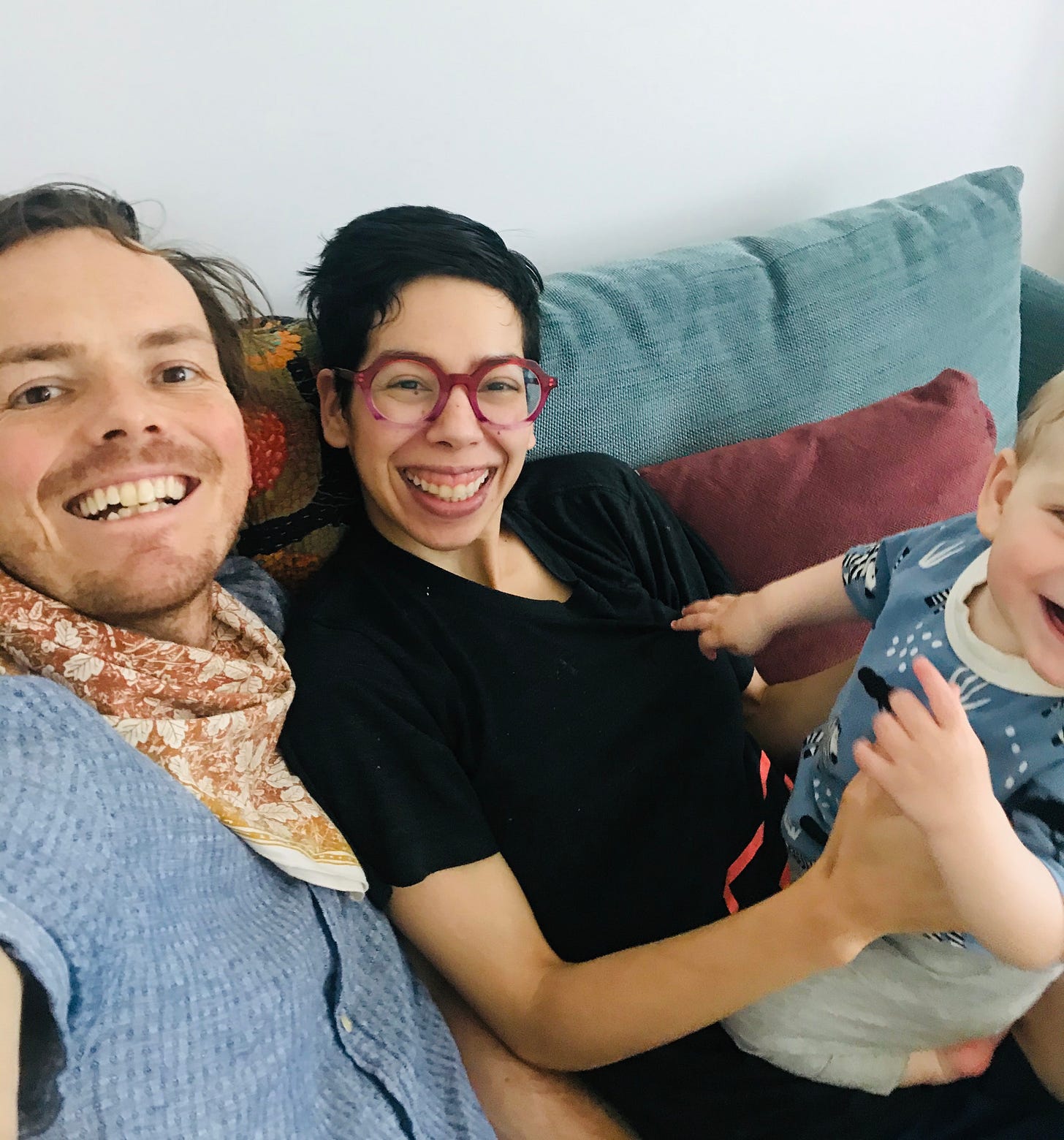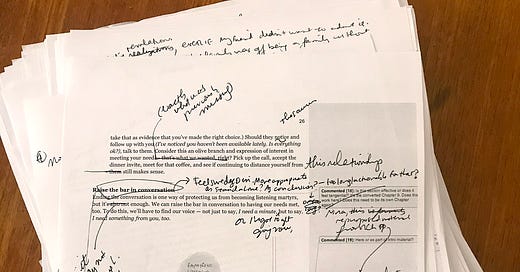Some 18 months ago, I signed my first book deal (!) and I’m super excited to share my book, Listen Like You Mean It, with the world come March 2021. In the meantime, I’ll share some of the behind the scenes of the book writing process, since I’ve learned a ton along the way and it’s not something people often talk about. Read on for the latest.
When an author reaches the “transmittal” phase of a book in development, it’s time to bust out the champagne. Transmittal is the time when the manuscript is officially passed off to copy editing — meaning that from that moment on, only teeny tiny edits can be made. The ideas, concepts, dialogue, structure — the meat of the book— must be locked in place before then.
18 months and some 88k words later, with the help of my editor, I’ve worked the ideas, illustrations, exercises in my book to their max — or at least to final deadline, since any writer will tell you the manuscript is never really finished. I’ve learned a lot over the course of many revisions— about how writing a book works, and more importantly, about how I write a book.
I’ll be honest — as a first time author, I didn’t really know what I was getting myself into when I submitted the book proposal for Listen Like You Mean It, a happy decision that would set my world in motion for the next two years. I had heard that book publishing, unlike the tech startups I had worked in, tended to move thoughtfully, deliberately, and, well, slowly. Two years to work on a single project sounded like a long time in my experience. I was used to working in much shorter increments, both in my day job as a user researcher, where eight weeks counted as a “long” project, and as a writer, where I worked primarily in short form, and efficiently (the average blog post takes me about an hour to produce, from blank page to published article). A book, of course, is a highly complex endeavor, but I didn’t know in just what ways it would be challenging until I was well into the writing process.
Some writers struggle to get started, but in my case, getting words onto paper wasn’t really the issue: the ideas poured out, the word count added up, and I blasted through a first draft of the manuscript. Great, right? Only later, I would realize this kind of quick and breezy output is both a blessing and a curse: I wound up cutting down some 30k words when it came time for edits, a process I found much more difficult than the writing itself.
Each draft was imperfect, but that seemed normal to me. “Iterating” is The Silicon Valley Way (Just ship it! Test and learn! Fail fast!) and I suppose after nearly a decade in tech it’s no surprise I’ve internalized this mentality and applied it to book writing. My husband sat in horror as I sent in “good enough” drafts to my editor round after round. (Don’t you want it to be perfect when you send it over? He’d ask. Better done than perfect! I’d quip.) That’s how I wound up going through six rounds of edits 😬. Each time I stripped down, fleshed out, revised, revised, revised, until I hit my deadline.

Editing by hand turned out to be much easier for me than editing on my computer — going analog made me far less attached to my words, and more comfortable putting entire paragraphs on the chopping block.
Until finally, just last week, I officially “transmitted” my manuscript to production. (!!!) My book is off in a copy editor’s hands, getting carefully pruned by an expert with far greater attention to detail than me. (Thank goodness for the detail-oriented!) And that, my friends, means that I’m done — sort of. I’ll still have copy edits to get through, and layout approvals, and galleys to distribute, and marketing and PR to do. But the writing — oh the writing! — the part that requires serious thinking time, immense concentration, along with the willpower to fight distractions like an adorable baby, a lovable but wild and barking dog, or just an evening out with friends (pre pandemic, that is), is done. Done!

Minutes after submitting my manuscript. Yes, I am in my pajamas past midday, and yes, my husband is as happy and relieved as I am that I’ve finished and can go back to being a fully functioning human being and partner again.
The act of writing is often a solo hobby that isn’t “visible” — so it’s easy for others not to “see” your work behind the scenes, or understand just how much has gone into the final version— and I sometimes forget that myself. I forget that two years ago there was not only no book, but also far fewer sacrifices I was being asked to make, and far less demands on my time to manage. I have to remind myself and appreciate that I wrote a freaking book — first while pregnant, then while taking care of a newborn, all while still working my 9-5, and more recently under a stay at home order, during a global pandemic. Every minute that I haven’t been working my day job, nursing my baby, consuming calories to stay alive, or coming up for air to keep my marriage, friendships, and family relationships in tact has been spent working on The Book. It’s moments like these I need to remember how I got here and take a beat to celebrate.
So here I am, trying to celebrate by sharing the news with all of you, by sitting back and taking a break from book-related activities for a bit, and by being a real human rather than the Book Robot I became these last few months.
Of course, Book Robot me will be back very soon. “First pass” pages are coming in a few weeks, illustration edits are piling up, and there are still some odds and ends to clean up before we get to final layout, and more fine-tuning behind the scenes to make the book appear in your hands like magic at the end of March.
But Book Robot can wait. For now, in this moment, I’m here to hit pause with you and do nothing more than take this moment in.




Congrats!!! This is so exciting! I'm curious to learn all of the behind the scenes stuff, it feels like a total black box to me. Two years is definitely an eternity by Silicon Valley standards - whew! And you also juggled a lot of other things too. Impressive. Enjoy the celebration, you deserve it!